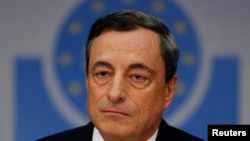European stock markets surged Thursday after the European Central Bank (ECB) indicated it is considering further action to boost the sluggish economy of the 18-member euro currency zone, which also threatens to drag down global economic recovery.
As expected, the European Central Bank left its main interest rate unchanged. It's already at a record low of only 0.05 percent. At a news conference Thursday afternoon, ECB chief Mario Draghi said the central bank wanted to first see the effects of measures already put in place to counter the risk of deflation and boost European economies.
But, Draghi also said the ECB was preparing for more action - if needed.
"Should it become necessary to further address risks of too prolonged a period of low inflation, the governing council is unanimous in its commitment to use additional and unconventional instruments within its mandate," he said.
The outlook is already pretty grim for the 18 nations using the euro currency. Governments have been slashing spending and raising taxes to overcome a years-long debt crisis. Overall eurozone unemployment is an alarming 11.5 percent. And both businesses and consumers have been tightening their belts, sparking fears the eurozone will fall into a downward price spiral known as deflation.
On Tuesday, the European Union cut growth forecasts for both the eurozone and the EU as a whole, citing a mix of factors including unrest in Ukraine and the Middle East, and falling business and consumer confidence.
While expressing confidence that the ECB's measures will ultimately prove effective, Draghi acknowledged the problems.
"The recovery is likely to be continued to be dampened by high unemployment, sizeable unutilized capacity and the necessary balance sheet adjustments in the public and private sector," he said.
Many analysts believe the ECB must take more drastic action than it has to date, including what is known as quantitative easing. That's the direct and large-scale buying of government bonds on the market.
Simon Tilford, deputy director at the Centre for European Reform in London, believes time is of the essence.
"The situation in the eurozone is very, very grave. Exceptionally grave," he said. "This is an economy that is still in some ways smaller than it was at the beginning of 2008. It's an economy with disinflationary pressures or even outright deflation across much of the currency. They waited long enough. At this point they need to be doing absolutely everything to stimulate activity and boost inflation. So that's not just monetary policy, that's not just quantitative easing, but they need to cut back on fiscal austerity - even provide some fiscal stimulus."
For now, Draghi's suggestion of further stimulus measures to come - and that the ECB's governing council is unified on its policies - has given a boost to the markets.




